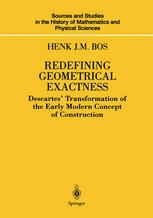

Most ebook files are in PDF format, so you can easily read them using various software such as Foxit Reader or directly on the Google Chrome browser.
Some ebook files are released by publishers in other formats such as .awz, .mobi, .epub, .fb2, etc. You may need to install specific software to read these formats on mobile/PC, such as Calibre.
Please read the tutorial at this link: https://ebookbell.com/faq
We offer FREE conversion to the popular formats you request; however, this may take some time. Therefore, right after payment, please email us, and we will try to provide the service as quickly as possible.
For some exceptional file formats or broken links (if any), please refrain from opening any disputes. Instead, email us first, and we will try to assist within a maximum of 6 hours.
EbookBell Team

4.4
32 reviewsIn his "Géométrie" of 1637 Descartes achieved a monumental innovation of mathematical techniques by introducing what is now called analytic geometry. Yet the key question of the book was foundational rather than technical: When are geometrical objects known with such clarity and distinctness as befits the exact science of geometry? Classically, the answer was sought in procedures of geometrical construction, in particular by ruler and compass, but the introduction of new algebraic techniques made these procedures insufficient. In this detailed study, spanning essentially the period from the first printed edition of Pappus' "Collection" (1588, in Latin translation) and Descartes' death in 1650, Bos explores the current ideas about construction and geometrical exactness, noting that by the time Descartes entered the field the incursion of algebraic techniques, combined with an increasing uncertainty about the proper means of geometrical problem solving, had produced a certain impasse. He then analyses how Descartes transformed geometry by a redefinition of exactness and by a demarcation of geometry's proper subject and procedures in such a way as to incorporate the use of algebraic methods without destroying the true nature of geometry. Although mathematicians later essentially discarded Descartes' methodological convictions, his influence was profound and pervasive. Bos' insistence on the foundational aspects of the "Géométrie" provides new insights both in the genesis of Descartes' masterpiece and in its significance for the development of the conceptions of mathematical exactness.